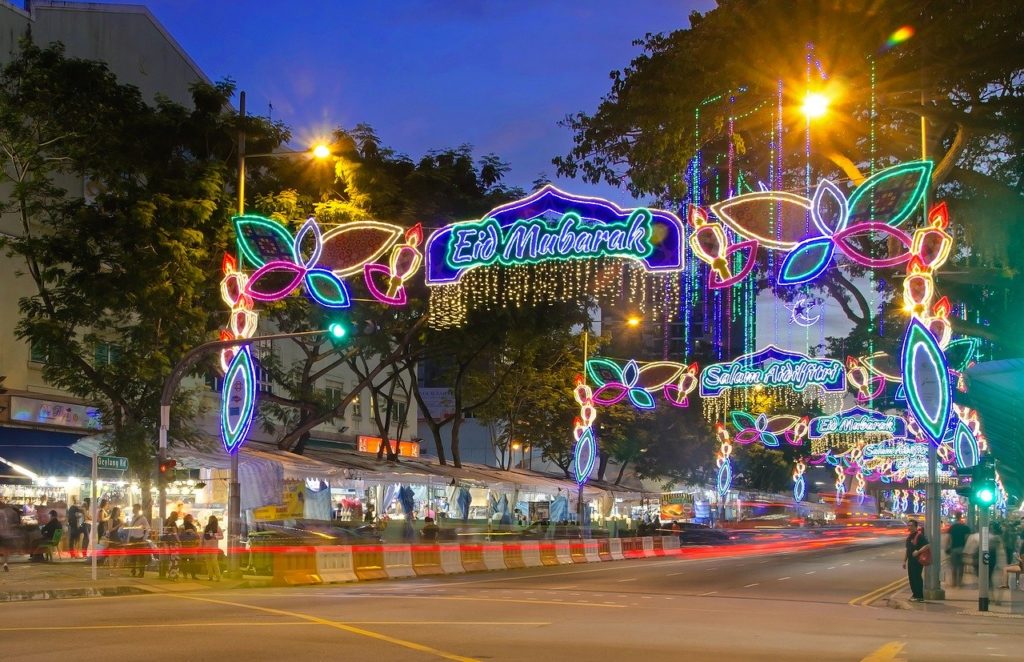Gripped by the COVID-19 pandemic, Singapore may have canceled the annual Ramadan pop-up markets and festive Hari Raya gatherings, but it’s not all doom and gloom for the Muslim community.
With days left until Eid, the internet has been bustling with live auctions of everything from traditional clothing to festive lights and goodies, bringing the Hari Raya cheer through social media feeds.
Bazaar Ramadan Singapore 2020 is one such place where the festive cheer is spreading through its 50,000 members and counting. Online businesses regularly share their live auctions there.
“I saw some post from online sellers that they are upset there’s no bazaar. Some of them have already ordered their products so I thought maybe we can just gather online instead,” group creator Huda Rahmat, 30, told Coconuts Singapore recently.
The healthcare administrator created the group in March, around the time Singapore announced there would be no Ramadan bazaars this year. Such markets blossom across the island annually during the Islamic holy month with the two most popular ones located in Geylang Serai and Kampong Glam.
Gusto Fashion and Minimalist Studio are among the regular Geylang Serai vendors who have taken their businesses online, and Briyani Bhai Catering – Nareza, known for its Mee Hoon Biryani, is one of Kampong Glam’s regular sellers who have switched to running their business digitally due to the coronavirus.
Competing for social media attention
“Hi everyone! Hello! Selamat Hari Raya!” began Wednesday’s live auction by Minimalist Studio as 36-year-old Hairul Nizam and his younger sister found a new home for their regular sale of traditional Baju Melayu and Kurung as festive music played in the background.
Hairul said that their live video auctions can sometimes feel like talk shows or an online community space for buyers to interact.
“It’s like a community among the buyers themselves. They don’t know each other [but] they know through our platform. That’s one way to make them stay,” he said.
Hairul competes for social media attention with other Ramadan auctioneers, with electronic sellers being some of their toughest contenders.
“On Facebook, there is too many competition. If you’re able to see, [there’s] so many auction like electronics … too many people doing live [auction] it slows down viewership,” he added. Minimalist SG’s live auctions get up to 10,000 views per session.
Mohammad Sayraz Khan, 31, who owns traditional men’s fashion label Gusto Fashion, echoed a similar sentiment.
“Getting the attention of viewers is a challenge. You need to not make it so boring,” he told Coconuts Singapore. Its live auctions attract hundreds of viewers.
Serving festive goodies to homes
No festive cheer is complete without food and with the lack of bazaars and the temporary disruption to home-based food businesses in Singapore, some in the Malay-Muslim community had difficulties getting hold of their favorite goodies. But as soon as Singapore made a U-turn on its rule banning food businesses from operating out of homes, the online community last week resumed its hustle and bustle over orders for Nutella tarts, dendeng (beef jerky), and more.
Biryani can also be considered as a popular meal to eat during iftar, or breaking of the fast, and regular Kampong Glam vendor Briyani Bhai Catering – Nareza was able to keep the Ramadan tradition alive through online orders and deliveries.
“Everyone tries to do their part to respond [to online orders] and the same person will cook as well,” Shaikh Ahmad, 34, who helps run his father’s business, said. The company delivers food prepared at a central kitchen in Tampines.
For those who miss hanging out over Indian teas at Kampong Glam’s Bhai Sarbat tea store during Ramadan, Salahudeen Provisions has been selling their special blend of teas directly to customers at homes.
“We thought why not we cater directly to [customers] … they also cannot go to coffee shops,” Muhammad Sarfudeen Salahudeen, 23, said. He has been helping his father run his business online after the provisions business saw a drop in orders of items like rice, sugar, and coffee from local coffee shops since the start of “circuit-breaker” measures.
But Sarfudeen said that his Bhai Tea is not the same as Bhai Sarbat’s as it is made of a “special blend” stemming from a “family secret.”
Out with the old?

With everything now happening online, will we need Ramadan bazaars next year? The short answer to that question is, yes. Because in spite of the high festive spirits on display online, businesses say they are still suffering major revenue losses, which they believe would not have happened if they could still sell at bazaars.
Minimalist Studio said it has been selling around 20 pieces of clothing per day this Ramadan as compared to the roughly 100 pieces at the Geylang Serai bazaar last year. Similarly, Gusto Fashion’s Sayraz said he is seeing a roughly 80%-90% drop in sales.
Selling traditional clothes online to picky buyers is also not an easy feat, Sayraz added.
“Also another challenging part is how to sell without consumers having the physical touch. With traditional clothes, people are more picky than with usual clothes. They are more sensitive about the materials, texture,” he said.
Briyani Bhai Catering – Nareza’s Shaikh said daily orders dropped considerably as compared to last Ramadan, from more than 100 orders a day last year to an average of 30 to 50 packets a day this year.
The additional operations that come with running an online business have not been helpful either, it seems. All three businesses told Coconuts Singapore they have had to spend extra cost and manpower on couriers and managing customers online.
“For FB live, the work is double and triple because [customers] are unable to feel the fabric. There are also size differences and they are only able to measure by themselves and roughly gauge what size they are,” Hairul said. “A lot of exchange and returns … [customers] have to get courier and come to pick up.”
The shift to online also means that the less tech-savvy lose out.
“We should still have Ramadan bazaars in the future. Some people just can’t adapt to doing business online. For my case, I was doing it for my dad,” Sarfudeen said.
Other stories you should check out:
Look good, feel good with clothes from these homegrown slow-fashion brands
Singaporeans flock to get hair cut as barbers, hair salons reopen





Reader Interactions